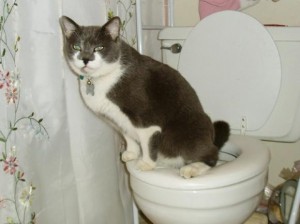Reasons Flushing Cat Poop Down Your Toilet Isn't a Good Idea - Advice for Proper Disposal
Reasons Flushing Cat Poop Down Your Toilet Isn't a Good Idea - Advice for Proper Disposal
Blog Article
This great article listed below pertaining to Can You Flush Cat Poop Down The Toilet? is fairly compelling. Check it out for your own benefit and figure out what you think about it.

Intro
As pet cat proprietors, it's essential to be mindful of how we dispose of our feline pals' waste. While it might seem hassle-free to purge pet cat poop down the toilet, this technique can have damaging effects for both the atmosphere and human health.
Environmental Impact
Purging feline poop presents damaging virus and parasites into the supply of water, presenting a considerable risk to marine ecosystems. These impurities can adversely affect aquatic life and compromise water high quality.
Health Risks
In addition to ecological concerns, flushing cat waste can likewise posture wellness threats to people. Cat feces may include Toxoplasma gondii, a parasite that can cause toxoplasmosis-- a potentially extreme ailment, especially for expecting ladies and individuals with damaged immune systems.
Alternatives to Flushing
Fortunately, there are more secure and a lot more responsible means to get rid of feline poop. Consider the complying with alternatives:
1. Scoop and Dispose in Trash
The most usual technique of getting rid of cat poop is to scoop it right into a biodegradable bag and toss it in the trash. Make sure to make use of a specialized clutter scoop and dispose of the waste promptly.
2. Use Biodegradable Litter
Go with biodegradable cat trash made from products such as corn or wheat. These trashes are environmentally friendly and can be safely gotten rid of in the trash.
3. Bury in the Yard
If you have a yard, consider hiding cat waste in an assigned location far from vegetable gardens and water sources. Make certain to dig deep adequate to stop contamination of groundwater.
4. Set Up a Pet Waste Disposal System
Buy a family pet garbage disposal system specifically created for pet cat waste. These systems utilize enzymes to break down the waste, lowering odor and ecological influence.
Conclusion
Responsible pet dog possession expands beyond supplying food and sanctuary-- it also entails appropriate waste management. By refraining from purging feline poop down the toilet and opting for different disposal techniques, we can minimize our environmental footprint and secure human health and wellness.
Why You Should Never Flush Cat Poop Down the Toilet
A rose by any other name might smell as sweet, but not all poop is created equal. Toilets, and our sewage systems, are designed for human excrement, not animal waste. It might seem like it couldn’t hurt to toss cat feces into the loo, but it’s not a good idea to flush cat poop in the toilet.
First and foremost, assuming your cat uses a litter box, any waste is going to have litter on it. And even the smallest amount of litter can wreak havoc on plumbing.
Over time, small amounts build up, filling up your septic system. Most litter sold today is clumping; it is made from a type of clay that hardens when it gets wet. Ever tried to scrape old clumps from the bottom of a litter box? You know just how cement-hard it can get!
Now imagine just a small clump of that stuck in your pipes. A simple de-clogger like Drano isn’t going to cut it. And that means it’s going to cost you big time to fix it.
Parasitic Contamination
Believe it or not, your healthy kitty may be harboring a nasty parasite. Only cats excrete Toxoplasma in their feces. Yet it rarely causes serious health issues in the cats that are infected. Most people will be fine too if infected. Only pregnant women and people with compromised immune systems are at risk. (If you’ve ever heard how women who are expecting are excused from litter cleaning duty, Toxoplasma is why.)
But other animals may have a problem if infected with the parasite. And human water treatment systems aren’t designed to handle it. As a result, the systems don’t remove the parasite before discharging wastewater into local waterways. Fish, shellfish, and other marine life — otters in particular — are susceptible to toxoplasma. If exposed, most will end up with brain damage and many will die.
Depending on the species of fish, they may end up on someone’s fish hook and, ultimately on someone’s dinner plate. If that someone has a chronic illness, they’re at risk.
Skip the Toilet Training
We know there are folks out there who like to toilet train their cats. And we give them props, it takes a lot of work. But thanks to the toxoplasma, it’s not a good idea.

As a keen person who reads on How to Dispose of Cat Poop and Litter Without Plastic Bags, I thought sharing that post was beneficial. Appreciated our blog posting? Please share it. Help others find it. Thank you so much for going through it.
Book An Estimate Now Report this page